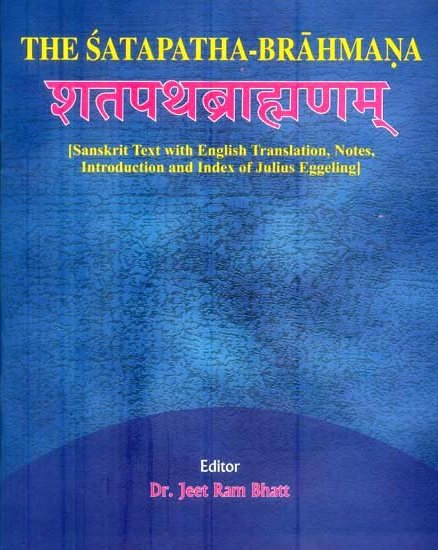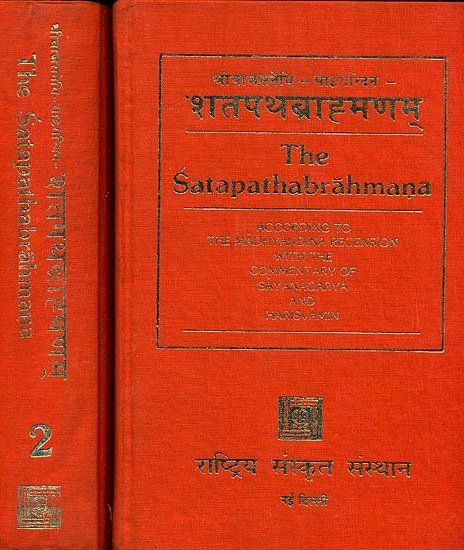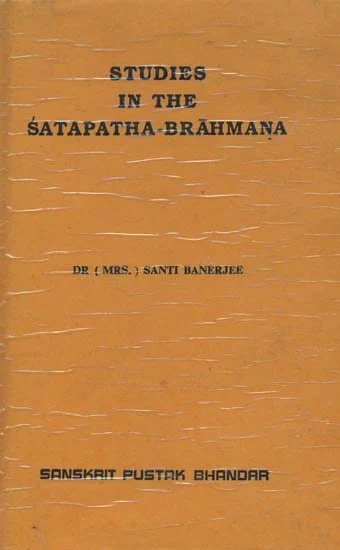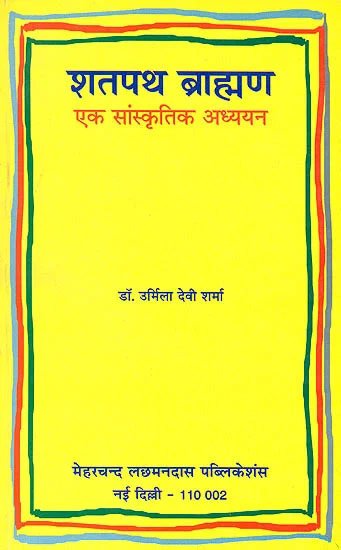Satapatha-brahmana [sanskrit]
147,532 words | ISBN-10: 812080113X | ISBN-13: 9788120801134
The Sanskrit text of the Satapatha-brahmana: One of the largest works in the category of Vedic (Brahmaic) literature, narrating in extensive detail the various rites, constructions, chants and utensils to be used in Hindu ceremonies. Alternative titles: Śatapathabrāhmaṇa (शतपथब्राह्मण), Śatapatha-brāhmaṇa (शतपथ-ब्राह्मण) Shatapathabrahma (shatapatha).
Verse 3.4.3.18
ta āpyāyayanti | aṃśuraṃśuṣṭe deva somāpyāyatāmiti tadasyāṃśumaṃśumevāpyāyayantīndrāyaikadhanavida itīndro vai yajñasya devatā tasmādāhendrāyetyekadhanavida iti śataṃśataṃ ha sma vā eṣa devānpratyekaika evāṃśurekadhanānāpyāyate daśadaśa vā tubhyamindraḥ pyāyatāmā tvamindrāya pyāyasvetīndro vai yajñasya devatā sā yaiva yajñasya devatā tāmevaitadāpyāyayatyā tvamindrāya pyāyasveti tadetasminnāpyāyanaṃ dadhātyāpyāyayāsmāntsakhīntsanyā medhayeti sa yatsanoti tattadāha yatsanyetyatha yadanubrūte tadu tadāha yanmaghayeti svasti te deva soma satyāmaśīyetyekā vā eteṣāmāśīrbhavatyṛtvijāṃ ca yajamānasya ca yajñasyodṛcaṃ gacemeti yajñasyodṛcaṃ gacānītyevaitadāha
Preview of English translation:
18. They strengthen him with (Vajasaneyi Samhita V, 7), “Let stalk after stalk of thine wax strong, O divine Soma!” whereby they strengthen (increase) stalk after stalk of his;—“for Indra, the winner of the ekadhanas;” Indra indeed is the deity of the sacrifice: therefore he says, “For Indra, the winner (or bestower) of the ekadhanas.” For verily every one of those stalks swells to fill a hundred or ten ekadhana cups for the several gods. “May Indra wax strong for thee, and wax thou strong for Indra!” for Indra is the deity of the sacrifice: he thus strengthens him who is the deity of the sacrifice. By saying, “Wax thou strong for Indra,” he instils that invigorating draught into him. “Strengthen us friends with gain and understanding!” 'With gain' he says with reference to what he gains; and 'with understanding' he says with reference to what he recites. “Mayest thou thrive, O divine Soma, and may I attain to the Soma-feast!” They, the priests and sacrificer, have one prayer in common, “May we reach the end of the sacrifice!” hence he thereby means to say, “May I reach the end of the sacrifice!”
For a detailled translation, including proper diacritics and footnotes, go the full English translation.
Other editions:
Also see the following editions of the Sanskrit text or (alternative) English translations of the Satapatha-brahmana Verse 3.4.3.18
The Satapatha Brahmana (In Five Volumes)
by Julius Eggeling (1882)
2551 pages; [Publisher: Motilal Banarsidass Publishers Pvt. Ltd.]
Buy now!
The Satapatha Brahmana (3 volumes)
by Dr Jeet Ram Bhatt (2009)
Sanskrit Text with English Translation; 1726 pages; [Publisher: Eastern Book Linkers]; ISBN: 9788178541693
Buy now!
The Satapatha Brahmana (With The Commentary of Sayanacarya and Harisvamin)
by Rashtriya Sanskrit Sansthan (2002)
3483 pages; [शतपथ ब्राह्मणम्] According to the Madhyandina Recension; Commetaries: (1) Vedarthaprakash (Vedartha-prakasha) by Shrimat-Trayibhashyakar Sayanacharya, (2) Sarvavidyanidhana Kavindracharya Saraswati.
Buy now!
Studies in the Satapatha-Brahmana
by Dr. (Mrs.) Santi Banerjee (1993)
236 pages; [Publisher: Sanskrit Pustak Bhandar]
Buy now!
Cultural Study of the Satapatha Brahman (in Hindi)
by Dr. Urmila Devi Sharma (1982)
106 pages; Shatapatha Brahmana Ek Sanskritik Adhyan; [Publisher: Meharchand Lakshmandas Publications]
Buy now!![Satapatha-brahmana [sanskrit] - book cover](/uploads/a/NAC457-Satapatha-Brahmana.jpg)



